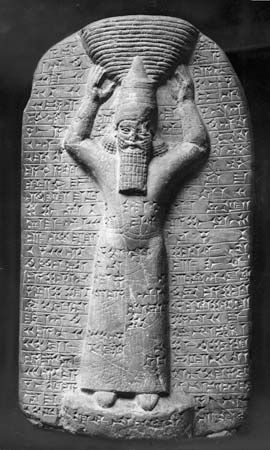Esagila
Esagila, most important temple complex in ancient Babylon, dedicated to the god Marduk (q.v.), the tutelary deity of that city. The temple area was located south of the huge ziggurat called Etemenanki; it measured 660 feet (200 m) on its longest side, and its three vast courtyards were surrounded by intricate chambers. The whole complex reflects centuries of building and rebuilding by the Babylonian kings, especially Nebuchadrezzar II (reigned 604–562 bc). The tremendous wealth of Esagila was recorded by the Greek historian Herodotus, who is believed to have visited Babylon in the 5th century bc. Babylon was excavated in 1899–1917 by German archaeologists; few objects of value, however, were found in Esagila, which had been thoroughly plundered in antiquity.








